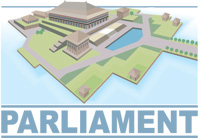Staying clear of any camp has paid dividends, FM tells House
View(s): 253
By Sandun Jayawardana
Sri Lanka’s foreign policy, based on the principle of “Friendship to all and enmity to none,” has brought results as it charts a path towards economic recovery, Parliament was told on Thursday.
Speaking during the debate on the head of expenditure of the Ministry of Foreign Affairs, Foreign Minister Ali Sabry said that Sri Lanka faces a challenge when safeguarding its long-practiced policy of non-alignment as it works to revive its economy. 
“Our biggest challenge is how we should not be drawn into any particular camp and seen as an extension of a particular country, region or alliance,” said Mr Sabry. The minister said he believes the country has succeeded in this, pointing out that Sri Lanka has now forged a very close bond with Japan, China, India, the US and countries in West Asia among others.
He noted that the country was also able to overcome its most recent challenge which involved having to convince countries whose opinions are vastly different to each other, to agree on a debt restructuring programme for Sri Lanka. Under the leadership of the President as Finance Minister, the government was able to get India, the 17 nations of the Paris Club and China all onboard to win an initial undertaking. “That was a great victory and it was that which helped us to obtain the first tranche of assistance from the International Monetary Fund (IMF).”
Mr Sabry also said that he expected the IMF’s Executive Board will review the agreement between Sri Lanka and its creditors represented by the Official Creditor Committee (OCC) on December 12, and expressed confidence that it will approve the release of the second tranche of the IMF’s bailout package for Sri Lanka, which would help it to move out of bankruptcy.
Credibility is very important in foreign policy, whether the agreements are oral or written, said Opposition Leader Sajith Premadasa. While Sri Lanka has been a signatory to protect human rights, civic, economic, political, social, cultural and religious rights, in the domestic jurisdiction, the government has embarked on a so-called Online Safety Bill and an Anti-Terrorism Bill. Mr Premadasa said such Bills destroy “the very essence of democracy, freedom of speech, freedom of thought, freedom of affiliation to political parties, expressing one’s vision and wishes.”
During the debate on the Ministry of Mass Media on Friday, National People’s Power (NPP) Leader Anura Kumara Dissanayake and Freedom People’s Congress MP Dullas Alahapperuma both raised issue over the decision to impose an 18% Value Added Tax (VAT) on the publication of books. They noted that no other country in the SAARC region has imposed VAT on books and urged Media Minister Bandula Gunawardana to intervene and ensure that books are kept on the list of items that are exempted from VAT.
In reply, Mr Gunawardana said he will try to intervene on the matter of VAT being imposed on books and items used by disabled persons but pointed out that no other country in the SAARC region had gone bankrupt. It is due to the difficult situation the country is in that such proposals are on the table.
The Media Minister also stressed that the proposed Broadcasting Regulatory Commission Bill was not being introduced with the aim of banning any media organisation. The Bill will adhere to the fundamentals of the codes of practice used by media in the UK, he added, saying the government’s intention was to create a media culture that speaks truth and does not incite hatred against anyone.
Speaking during yesterday’s debate on the head of expenditure of the Ministry of Agriculture, Opposition Leader Sajith Premadasa meanwhile, raised issue over no one being held to account thus far over the USD 6.9 million loss caused to Sri Lanka in the matter of the Chinese shipment of 20, 000 metric tonnes of organic fertilizer, which the government had to pay after rejecting the shipment over the discovery of harmful bacteria in the shipment.
Agriculture Minister Mahinda Amaraweera said the matter has been referred to the Criminal Investigation Department (CID).
Other heads of expenditure that were debated this week included those of the Ministries of Education, Labour and Foreign Employment, Ports and Shipping, Agriculture and Plantation Industries. The committee stage debate on Budget 2024 will conclude on December 13.
|
Justice Minister’s stand In reference to the statement made by Tamil National Alliance (TNA) MP M.A. Sumanthiran during the debate on the head of expenditure of the Justice Ministry that appeared in these columns, Justice Minister Wijeyadasa Rajapakshe notes that he replied Mr Sumanthiran in detail during the debate. Regarding the claim that a Buddhist monk in Batticaloa was threatening Tamil civilians, Mr Rajapakshe pointed out in reply that the Justice Minister had no power to arrest such persons and noted that if there is such an issue, a complaint should be made to the police and the police should enforce the law on the matter. Regarding the issue that Magistrates in the North and East were issuing orders prohibiting “Mahaveer” commemorations for fallen LTTE cadres, Mr Rajapakshe noted there is nothing to be ashamed about magistrates exercising their independence. As for suspects being arrested under the Prevention of Terrorism Act, the Minister’s reply to the TNA MP pointed out that the PTA is a law that is in effect.
|
|
